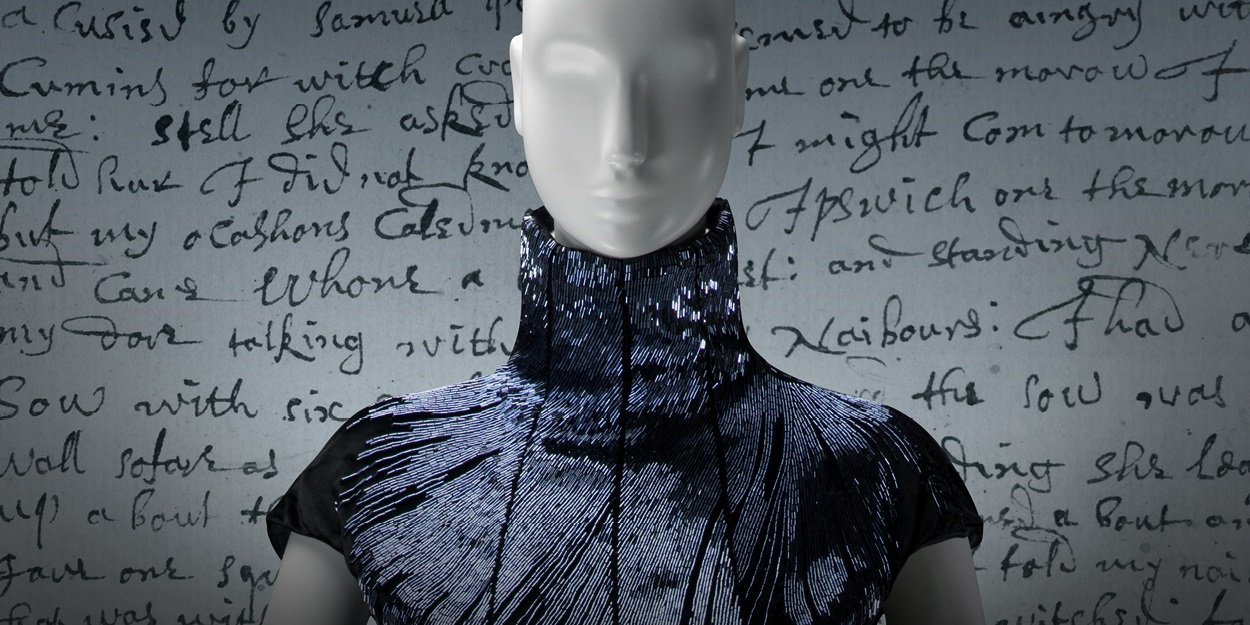Alexander McQueen, 1969–2010. Evening dress (detail), from the In Memory of Elizabeth How, Salem, 1692, Ready-to-wear collection, fall/winter 2007. Velvet, glass beads, and satin. Peabody Essex Museum. Bob Packert photograph
Cancel culture? Not in Salem.
The Salem Witch Trials ended in the murder of at least 25 children, men and women in the 1690s. Most were hung. Some were tortured first, including some children.
To celebrate that history, Salem—Witch City—hosts thousands of visitors during the months leading up to Halloween. Halloween had nothing to do with the original injustice, but it’s convenient for witches.
Stores, restaurants and museums welcome fancifully dressed visitors who come to the city because, more than three centuries ago, citizens were hanged nearby. Most of those visitors dress up, to see and be seen, to be part of the cosplay experience. Dead witches make great business.
An exhibition at the Peabody Essex Museum, “The Salem Witch Trials: Reckoning and Reclaiming,” runs concurrently with this year’s festivities. PEM creates a new exhibition most years for the celebration.
For this year’s version, a fashion designer, who discovered that one of the hanged “witches” was an ancestor, designed a line of dresses in her honor/for profit. One of the dresses—proudly acknowledged as a recent gift to PEM—stands on display, visible in front of a gruesome timeline marking the dates of false accusations, sham trials and death.
Nothing should be celebrated here. But even in an era that is actively reassessing the origins of many holidays, the cavalier attitude toward murdered innocents deemed “witches” continues, unquestioned. Wouldn’t want to spoil business.
To its credit, PEM doesn’t hide the historical horror in “The Salem Witch Trials.” Many documents from its archives detail the hysterical misdirection taken by the authorities. Heartfelt letters, written by the accused, reveal their humanity and desperation.
But juxtapositions, like Alexander McQueen’s fashion theatrics displayed directly in front of the impassive, factual timeline of brutality, render what could be a sober, forward-thinking exhibition into just another event in the seasonal carnival.
Exhibition labeling—in a kind of institutional blindness—boasts that there weren’t any witches then, but there are now. As part of “The Salem Witch Trials,” some of them are on display.
Frances F. Denny’s arresting photographs of modern-day Wiccans, healers, witches, pagans and artists—a wide spectrum of identities and spiritual practices—seems more appropriate to whatever commemoration should be held. The images are part of Denny’s book-length series, “Major Arcana: Portraits of Witches in America.”
Denny’s photographs do not confront the past, or even acknowledge it, except to show that baseless accusations have long been used to silence those who seem like outsiders. But modern-day witches usually face only condescension or scorn. Uninformed behavior doesn’t always lead to innocent deaths. Not always.
Rather, the portraits show that this foolishness—which began with murders three hundred years ago and has ended up with parades of ghouls and superheroes through East India Square—means little to the stories of the citizens then, and to the citizens now, who were found to be outsiders.
“The Salem Witch Trials: Reckoning and Reclaiming,” runs through March 2022 at the Peabody Essex Museum, East India Square, 161 Essex St., Salem. Visit pem.org or call 866-745-1876.
Keith Powers covers music and the arts for Gannett New England, Leonore Overture and Opera News. Follow @PowersKeith; email to keithmichaelpowers@gmail.com.


